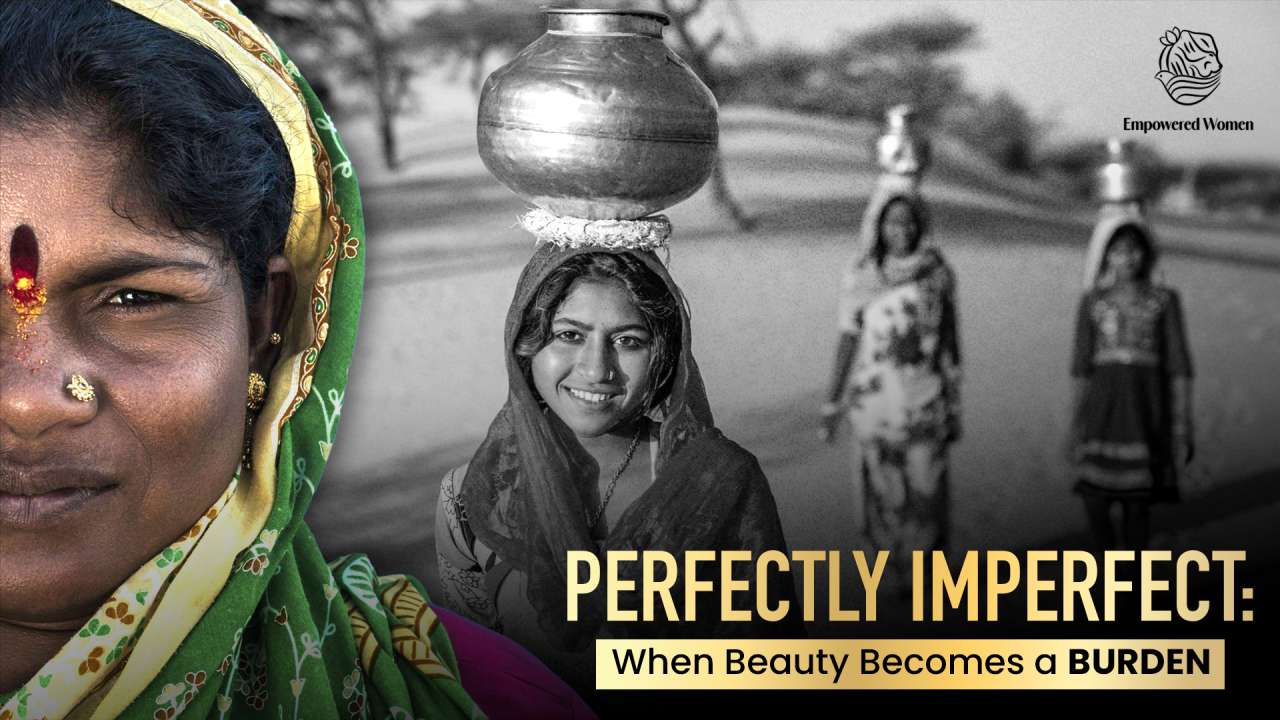In India, we’re blessed with countless traditions. From festivals to family dinners, every ritual is crafted with a deep meaning and a story to tell. But there’s one unspoken “tradition” that many women silently endure: the expectation to remain forever youthful and beautiful. Society worships a youthful glow, and God forbid if a wrinkle dares to show itself on a woman’s face. For an Indian woman, aging is like inviting judgmental whispers and sideways glances, and the pressure to stay young doesn’t just end with skincare but seeps into every inch of her being.
Let’s dive into why Indian women, especially, often harbor a fear of aging—and, spoiler alert, it’s not because they hate birthdays!
The “Shobha of the House” Syndrome
Every Indian girl is raised to believe she’s meant to be “the shobha of the house”—a decorative piece that must look pleasing at all times. Growing up, we hear it all too often: “Beta, girls should look beautiful. A family’s respect depends on it.” We’re indirectly told that our worth is tied to our looks, as if we’re ornamental items rather than people with thoughts and dreams. By the time a girl is in her 20s, she knows the unwritten rule: her skin, her weight, her hair—everything must work together to keep her “presentable.”
But beauty is transient, and with time, things change. Wrinkles and gray hair appear. But while men with silver streaks are labeled as “distinguished,” an aging woman’s first thought often isn’t about wisdom—it’s about how quickly she can cover those grays before anyone notices. Why? Because aging, for a woman, is a one-way ticket to “losing her shobha.”
Fair Skin, Dark Realities
Colorism is no stranger to Indian society, and when it comes to women, it’s another pressure point in the struggle against aging. The obsession with fair skin runs so deep that girls are told to avoid the sun and even handed fairness creams as teenagers. “Dark skin is fine on men, but on a woman, it shows a lack of care,” the society suggests.
So, as women age, many are hit with a double blow: not only do they face wrinkles, but their complexion often changes too. The youthful, fair glow might start to fade, and with it, so does the confidence that society once drilled into them about being “beautiful.” It’s a harsh reality, but for many, complexion becomes as important as character, and aging brings a new layer of insecurity to their lives.
The Weight of Expectations
Indian aunties seem to have one universal goal in life—to comment on a woman’s weight. As women age, metabolism naturally slows, and the body changes. But in India, a middle-aged woman who’s gained a few kilos is often viewed as “letting herself go.” Slim and slender is the unspoken rule; anything else? “She must have stopped caring.”
From sangeets to Sunday family gatherings, women are expected to look a certain way—slim, put-together, and with no visible signs of age. And if they don’t fit that mold, they’re whispered about and questioned. “Are you not taking care of yourself?” they ask, while the poor woman silently wishes she could simply embrace her changing body without shame.
Marriage and the Expiration Date of Beauty
Indian culture treats marriage as the ultimate milestone in a woman’s life. And here’s the kicker: it’s implied that a woman’s beauty has an expiration date. In fact, Indian matrimony advertisements often shamelessly list requirements like “fair, slim, beautiful bride wanted.” Ever seen “handsome groom wanted with wrinkle-free skin”? Nope, because that’s only for women to worry about.
Once married, the focus on a woman’s appearance doesn’t fade; it just shifts. She’s now tasked with maintaining that same youthful allure, not for herself, but to “keep her husband interested.” Society has crafted this subtle message that a woman’s beauty is tied to her family’s happiness. No pressure, right? So, as she ages, she’s left wrestling with insecurities, fearing that each wrinkle makes her less desirable, less valuable.
Empty Promises
In recent years, the market has caught onto this fear of aging, and we’ve seen a boom in anti-aging creams, serums, and treatments. “Look younger instantly!” these products promise, and millions of Indian women flock to them. The irony? Aging is a natural process. But women have been so conditioned to resist it that they’ll willingly spend thousands to turn back time—only to be disappointed when a “miracle cream” doesn’t magically erase the marks of time.
In a world where men’s wrinkles are “character lines” and women’s wrinkles are “flaws,” anti-aging products have become a sad necessity for women who just want to feel accepted as they are. It’s satire in the rawest form: women, who should be celebrated for the wisdom they gain with age, are instead buying products to pretend it never happened.
So, When Can Women Just… Be?
Here’s a thought: what if we celebrated a woman’s laugh lines as signs of all the joy she’s spread? What if her graying hair was admired as a symbol of her experience and strength? But instead, women are left to battle societal expectations alone. Aging could be a liberating experience if it weren’t for the noise of judgment that surrounds it.
In the end, it’s not the aging that scares most women; it’s the loss of respect, the lack of appreciation, and the diminishing confidence. What women in India are truly afraid of isn’t growing older—it’s that they might be seen as invisible, as less valuable, as if their worth was ever just skin deep.
The truth is, a woman’s beauty is as timeless as her spirit, but until society begins to see that, women will keep buying into the fear of aging. Because as far as the world is concerned, a woman’s worth is forever tied to the wrinkle-free, spotless, and fair image society has painted for her.
Time for Change
For every woman who feels pressured by this image, remember: your worth isn’t defined by smooth skin or your waistline. You’re allowed to age. You’re allowed to change. And most importantly, you’re allowed to live as beautifully as you want to—without anyone else’s definition of “shobha.”




